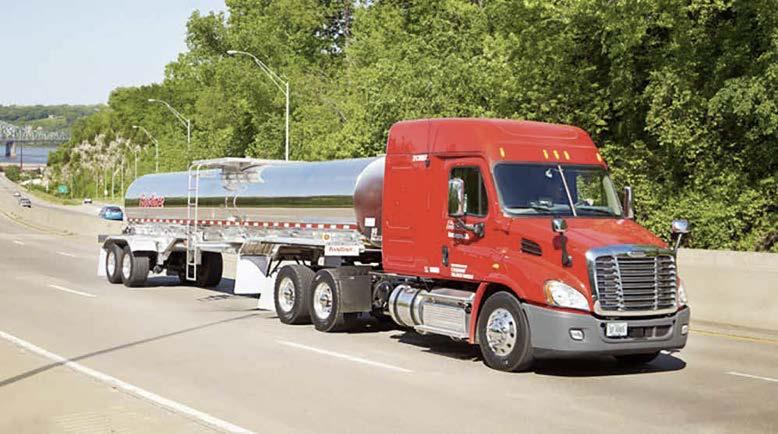
In recent years, North American heavy-duty diesel (HDD) vehicle sales grew strongly, reaching 276,000 units. But with great growth and great investment comes great responsibility: new government Greenhouse Gas (GHG) Regulations demanding lower 𝐶𝑂2 levels are driving lower viscosity engine oil trends in the heavy-duty market.
In addition to being more eco-friendly, this transition — from SAE 15W-40 diesel engine oils to heavy-duty engine oils (HDEOs) with lower viscosity grades such as SAE 10W-30 — delivers improved engine aeration performance, wear and deposit protection, oxidation control, and shear stability of your fleet's engines.
Since the fuel-saving benefits of lower-viscosity lubricants are considerable, and OEM specifications support their use, the growth of lower-viscosity grades should be significant.

Why Use Low-Viscosity Products?
Viscosity is an engine oil's most important property. Switching to a low-viscosity HDEO (heavy-duty engine oil) can offer unprecedented fuel economy benefits:
- Lower Greenhouse Gas Emissions – Carbon reduction regulations by the Environmental Protection Agency are driving technologies in newer diesel engines aimed at lowering Greenhouse Gas emissions. The principal way to lower 𝐶𝑂2 levels is to improve fuel economy (burn less gas/diesel).
- Fuel Savings – A switch from 15W-40 to 10W-30 can save up to 3% fuel through outstanding oxidation performance.
However, some may be concerned about low-viscosity grades' wear protection capabilities. As HDD fleet owners and operators become increasingly comfortable with API CK-4 SAE 10W-30 fluids, they still hesitate to use lower viscosity if not explicitly supported across the entire fleet.
The good news is that newer truck engines are fitted with applications, such as polymeric coatings, for enhanced fuel economy and friction protection. More OEMs are adopting 10W-30 CK-4 HDEOs for their factory-fill, and some are going even further with FA-4. As a result, modern engine oils are designed to operate on SAE 10W-30 oils and handle the smaller, hotter running, higher output engines that are more common today.

Finally, when it comes to viscosity, thicker is not always better. Instead, a balanced formulation, proven to provide engine protection and fuel economy benefits, should be considered.

Low-Viscosity Products are the Answer to Fleet Engine Needs
Switching to low-viscosity, heavy-duty products will give your engine the power to deliver more. Heavy-duty engine oils offer:
- Improved engine durability, performance, and protection in old and newer engines.
- HDEOs are formulated for heavy, medium, and light-duty off-road and commercial on-road vehicles and stationary diesel engines.
- HDEOs are approved or suitable for use by leading heavy-duty engine manufacturers, including Ford, PACCAR, Volvo, Caterpillar, Cummins, Mack, Detroit Diesel, and Mercedes-Benz.
- Some HDEOs, such as CITGO's CITGARD line, are guaranteed to reduce total operating cost, improve fuel efficiency*, and improve carbon footprint (CITGO offers a Guaranteed Efficiency Program)
The following case studies showcase the advantages of switching to low-viscosity engine oils for diverse-sized fleets.
Brundage Bone and Foodliner® both found cost savings and performance improvement via a switch to low-viscosity oils.

The largest concrete pumping company in the United States — Brundage-Bone — operates the nation's most extensive and diverse fleet of concrete pumping vehicles and equipment. The top business priorities are reducing annual fuel costs — their most significant expense — and improving equipment availability and operational efficiencies. Following consultations with CITGO technical experts, Brundage-Bone switched their 450-fleet to a Synthetic Blend 10W-30 Heavy-duty Engine Oil.
Six months of careful evaluation of fleet performance data from Brundage-Bone's independent telematics solutions provider showed that Brundage-Bone realized up to 2.5% annual fuel cost savings by switching to low-viscosity engine oils.
"A 2.5% savings on fuel cost for us is huge as fuel is our largest expense," said Jeff LaBounty, National Service Manager for Brundage-Bone.

One of America's largest bulk food grade carriers and a Transport Topic Top 100 carrier since 2014, Foodliner® places a premium on asset reliability and availability, lower total cost of ownership, product accessibility, and cutting-edge technology. A bulk carrier since 1958, Foodliner® operates a fleet of old and newer diesel and multi-fuel engines, transiting varying temperature ranges across North America.
Foodliner® turned to CITGARD for improved engine protection, performance, and preventive/predictive maintenance planning. "CITGO has consistently delivered solutions that help the company make smarter, data-driven business decisions," said Kyle Neumann, Director of Corporate Maintenance at Foodliner®/Quest Liner.
The CITGO team set Foodliner® up for a great start with the CITGO LubeAlert™® Fluid Condition Monitoring Service — a decision Neumann calls "priceless." Oil sample trends assured Foodliner® that CITGARD was providing its engines with excellent lubrication beyond the original equipment manufacturer's recommended limits, giving the maintenance team the confidence to extend oil drain intervals, dry preventive maintenance schedules, and drop several wet maintenance schedules. For Foodliner®, these changes translate to lower cost per mile (1.5% fuel cost savings), increased driver uptime, lower maintenance costs (90,000-mile oil-drain interval), and improvement in delivery timelines. Foodliner® did not hesitate to switch to low-viscosity engine oils based on performance test results.
Moving to Low Viscosity Engine Oils Can Provide Improved Cost Control, Streamlined Inventory Management
As pressures to curb 𝐶𝑂2 emissions drive the auto industry to improve fuel economy further, we can expect the trend of lower-viscosity engine oils to continue. Since the fuel-saving benefits of lower-viscosity lubricants are considerable, and OEM specifications are being introduced to support their use, the growth of lower-viscosity grades should be significant.
Contact your supplier about choosing lower-viscosity heavy-duty engine oils for your multi-fleet operation. A simple shift can help improve the predictability of your repair and maintenance costs and could also help streamline and simplify your inventory planning and supply needs.








